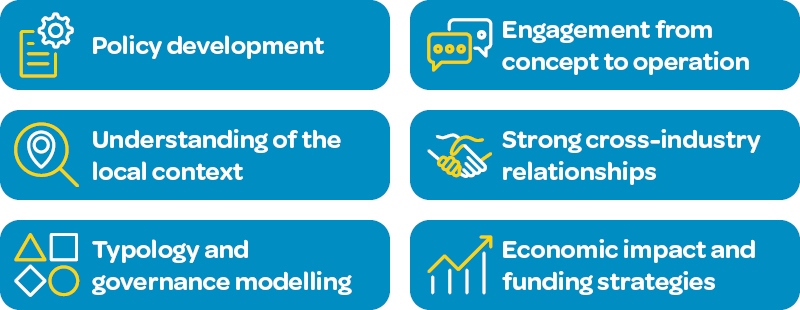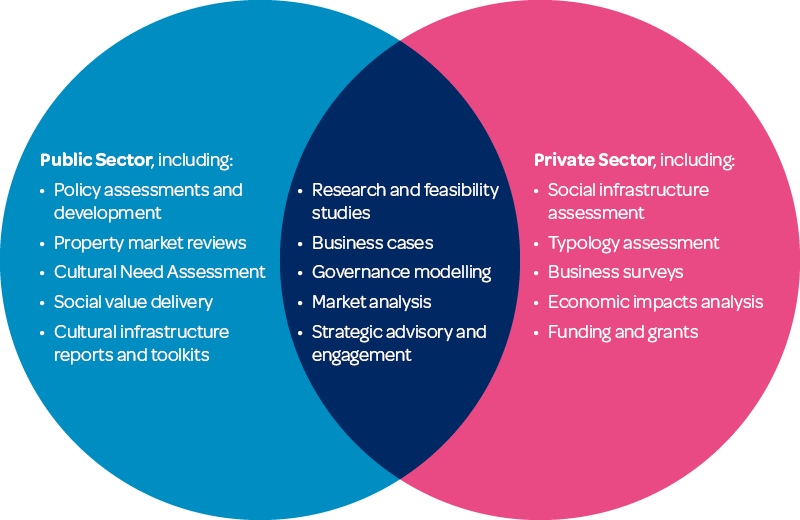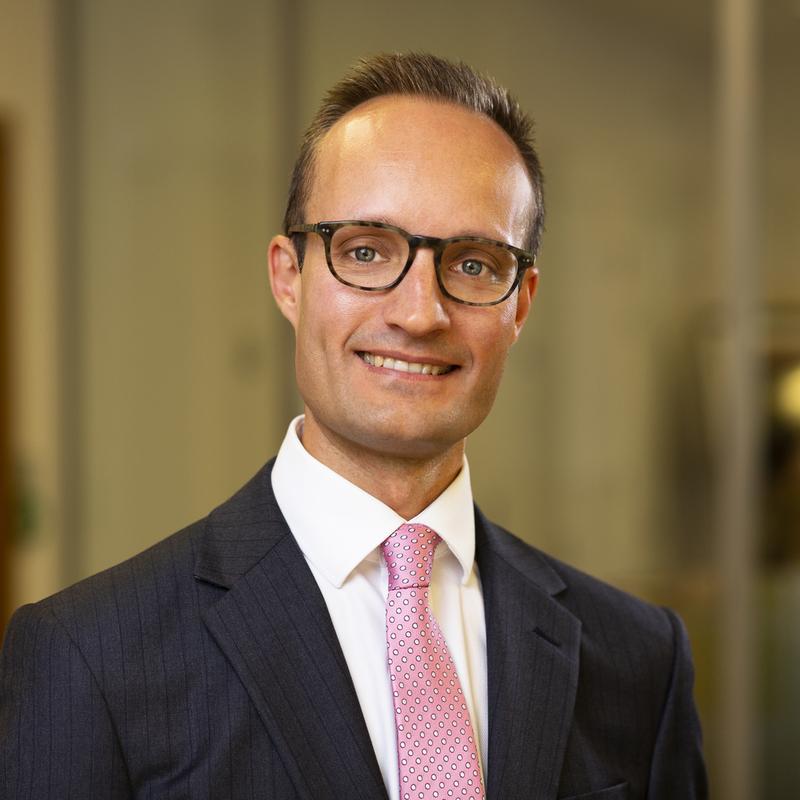Showcase
Developing Cultural Infrastructure for Cities and Communities
Cultural infrastructure enables authentic cultural experiences to live and breathe as a core part of successful cities, today and in the future.
It encompasses the buildings, structures and places where culture is either enjoyed or produced. Both elements are needed for the delivery of consistent, engaging experiences that create thriving communities and enhance the city's appeal.
Shifts in behaviours, from increased online retail to post-pandemic adaptations such as hybrid working, have reduced traditional draws into city centres and redirected demand towards vibrant and dynamic cultural experiences. By creating cultural infrastructure, both workspace for production and venues for performance and consumption, cities can unlock an increasing array of emerging opportunities across cultural spheres, experiential activities, wellbeing and education to attract visitors. Tourism revenues are also important export receipts.
Planning for cultural infrastructure
As a diverse and complex sector, with multiple artforms and uses, precise stakeholder engagement and a thorough understanding of both public and private drivers is essential. The power of collaboration through effective engagement with the cultural eco-system’s diverse stakeholders and an expert focus on social value is key to catalysing meaningful change.
Opportunities
The integration of cultural infrastructure, creative regeneration and the wider link with creative industries strengthens communities and consistently draws people into the city centre through a futureproofed strategic approach. This approach is sustainable for both developer and operator to foster greater economic resilience.
Successful cultural infrastructure projects respond to four areas:

- Create for creatives – Whilst many venues are being developed, there is a growing gap for workspaces dedicated to the cultural sector and creative industries generating the experiences. These spaces, often unique in their requirements, are increasingly driven out by other uses, typically based on financial metrics. They support the creative economy, ensuring long-term functional use of venues and create a regenerative partnership with creative communities.
- Respond, respect, revive - Innovative planning and development models that respond to the traditions and characteristics of our communities, respect their understanding of needs and revive the conditions of infrastructure required for success, breathe new life into a cities’ offer.
- Revenue-led real need - Through assessing revenue sources we can respond to a real need and create vibrant cultural infrastructure that is rooted in demand. Identifying complementary sectors such as sports, stadia, or higher education, helps ensure viability through a clearly defined cultural use-case.
- Invest in the future - Cultural infrastructure provides a cost-effective route to improving quality of life, social cohesion and resilience of communities by investing in places where innovation, education and heritage thrive. Adaptive environments, emerging technologies and sustainable practices enable development to change responsively to evolving demands.
Our offer

Policy development
Working alongside cities, public and semi-state organisations to develop effective spatial, economic and social policies to ensure the development of cultural uses, and support emerging infrastructure through research studies, feasibility and business cases to ensure sustainable cultural spaces can be delivered as part of wider regeneration.
Understanding of the local context
Our assessments of local policy landscape, property market reviews and careful consideration of the constraints and needs of communities is grounded in effective engagement. We are rooted in the places we work through social and business connections. Our expertise in Strategic Communications, Cultural Need Assessment, Market Analysis and Social Value ensure alignment with local culture and community expectations. We produce successful city-wide strategies.
Typology and governance modelling
Based upon our understanding of the policy context and local needs, we advise on the most effective infrastructure typologies in response to local demographics, cultural traditions, community dynamics and market reality. This advice is often coupled with governance models that ensure sustainable management and operation of cultural facilities.
Engagement from concept to operation
We prioritise incorporating end-user, funder and investor perspectives early in the development process, crucial for the success of projects in this sector. From the earliest stages of the initial design to operational strategies, our expertise spans the development lifecycle and we understand how to appropriately facilitate and embed end-user engagement. Our cross-disciplinary capabilities – including Planning, Strategic Communication, Business Cases and Funding, Economics, Heritage, Sustainability and ESG and more – are integral to this.
Strong cross-industry relationships
Our track record delivering an extensive breadth of projects removes the roadblocks that are common due to specialist requirements. We maintain active relationships with effective sub-consultants across various specialties, including RICS surveyors and unique sector advisors, to ensure we deliver holistic advice in response to the broadest needs of communities.
Economic impact and funding strategies
We are able to expand business surveys to explore wider economic impacts, using representative data to inform development strategies. Combined with focused efforts on identifying and securing funding and grants for cultural projects, we ensure a comprehensive understanding of financial viability for identification of the optimal routes forward.
We offer services to both the public and private sectors to support the success of existing and developing cultural infrastructure:

Culture-led regeneration: Manchester International Festival (MIF)
Turley has been an Associate Supporter of Manchester International Festival (MIF) for five consecutive years. MIF is as a powerful example of culture-led regeneration, with a programme of shows and events, many of which are hosted at Aviva Studios, part of St John’s Enterprise City and home to Turley’s Manchester office. If you would like to learn more about the value of MIF as an example of culture-led regeneration, or our support of the festival, please contact Richard Laming.
For more information on our Cultural Infrastructure offer, please contact John Davison and Catherine Murray. You can also explore our project experience and latest news below.
Key contacts
Emily Bell
Director, Strategic Communications, Net Zero Infrastructure Lead
Our latest Cultural Infrastructure projects, news and insights
Project
Cultural Infrastructure Study, Dublin
| Client | Various |
|---|---|
| Turley office | Dublin |
| Status | Complete |
Project
Tileyard North, Wakefield
| Client | City and Provincial Properties Investments Ltd (CPPI) |
|---|---|
| Turley office | Manchester , Leeds |
| Status | Approved / ongoing |
Project
Dublin North Central Arts Research
| Client | Dublin City Council |
|---|---|
| Turley office | Dublin |
| Status | Complete |
Project
Southport Town Investment Plan and Masterplan
| Client | Sefton Council |
|---|---|
| Turley office | Manchester |
| Status | Complete |
Project
500-Seat Venue, Dublin City Cultural Venue
| Client | Dublin City Council |
|---|---|
| Turley office | Dublin |
| Status | Complete |
Project
Bath Artists' Creative Quarter
| Client | Bath and North East Somerset Council |
|---|---|
| Turley office | Bristol , London |
| Status | Produced baseline report on Bath-wide artist engagement. Market assessment, economic value assessment and operational model. |
News
20 June 2024
New toolkit by Dublin City Council and Turley will help property developers create new cultural and community spaces
Dublin City Council has launched a ‘Cultural Toolkit’ and guidance for property developers on delivering new cultural and community spaces within ...
News
17 February 2023
Pinewood Studios granted permission for expansion and new nature reserve
Acting on behalf of Pinewood Studios, Turley has helped secure approval from Buckinghamshire Council on plans for a 1.4 million sq ...
Project
No. 2 Royal Avenue, Belfast - Options and Feasibility Study
| Client | Belfast City Council |
|---|---|
| Turley office | Belfast |
| Status | Report finalised |
Project
Digbeth Framework, Birmingham
| Client | Oval Real Estate |
|---|---|
| Turley office | Birmingham |
| Status | Resolution to grant planning permission. Ongoing |
Project
The Liberties Creative Campus, Dublin
| Client | Dublin City Council |
|---|---|
| Turley office | Dublin |
| Status | Complete |
Project
Pinewood Studios
| Client | Pinewood Studios Ltd |
|---|---|
| Turley office | Manchester |
| Status | Outline reserved matters approval for phases 1 & 2 issued |
Project
Sandwell Aquatics Centre
| Client | Wates and Sandwell Metropolitan Borough Council |
|---|---|
| Turley office | Birmingham |
| Status | Complete |
News
15 April 2024
Turley support Dublin City Council launch of Cultural Toolkit to help developers create new cultural and community spaces in the city
Last week Dublin City Council announced the development of a new ‘Cultural Toolkit’ resource and guidance for property developers, to be ...
News
22 April 2024
Turley confirmed as part of partnership team for Camden Film Quarter development
Yoo Capital has appointed several expert partners, including Turley’s Strategic Communications team, to help realise its vision for Camden Film Quarter ...



